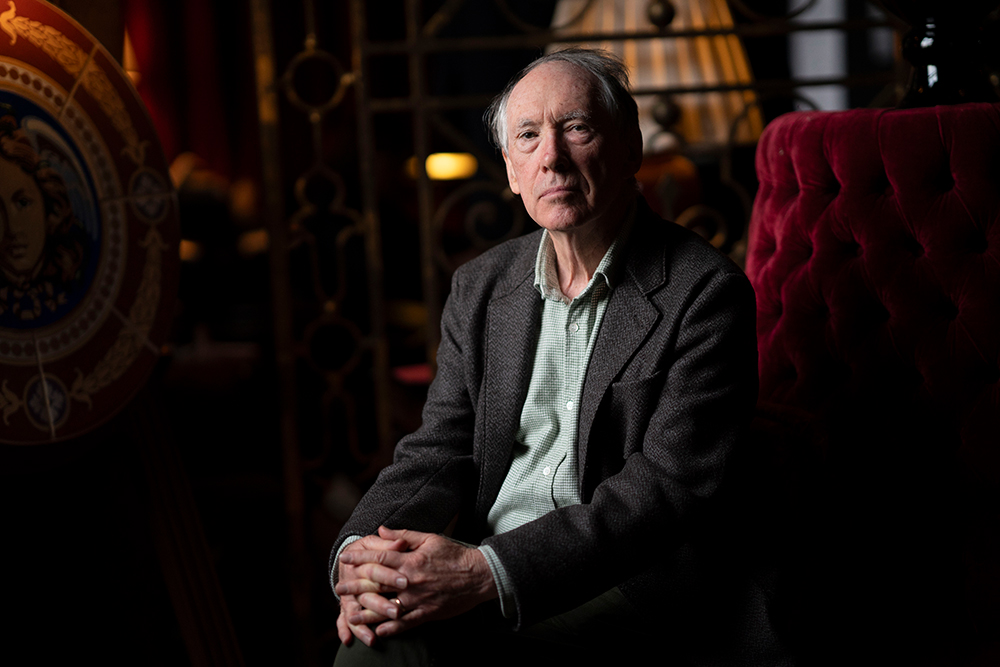
Ian McEwan delivers pleasure on the page with the ticktock reliability of an expensive Swiss watch. Even the lesser novels are immaculately written and cleverly plotted, full of provocative ideas, captivating characters and compelling incidents. In the better novels, he achieves a kind of elevated self-awareness, a supercharged intelligence that gives the fiction what feels like literary autonomy. My favourites, Black Dogs (1992) and Atonement (2001), seem to take on a life of their own. I imagine McEwan serenely blessing their emancipation.
What We Can Know is not lesser, and the pleasures – bookish pleasures, especially –are in abundant supply. As the title implies, McEwan is testing the limits of human knowledge. His narrow concern is literary biography; more broadly, he plumbs the wilful, species-wide stupidity at the root of the climate crisis, a topic he tackled with comedy in Solar (2010).
The new novel opens on a spring day in 2119, and already in the first paragraph we learn that what was once the United Kingdom is mostly under water. As a result of the ‘Inundation of 2042’, it’s now an ‘archipelago-republic’, its population halved. A literary scholar, Thomas Metcalfe, is pursuing his research at the Bodleian Snow-donia Library (many of the surviving cultural institutions have relocated to higher ground). His quarry is a famous lost poem, ‘A Corona for Vivien’ by Francis Blundy, written more than 100 years earlier, in 2014.
Blundy is ‘ranked with Seamus Heaney as one of the greatest poets writing in English in the late 20th and early 21st centuries’. He composed his technically daunting corona, a sonnet sequence that was probably his masterpiece, for his wife’s birthday. He wrote it out on vellum to present to Vivien at a dinner party in her honour and destroyed all other versions and drafts. Only because he read it out loud to the assembled guests does the world know anything about it. The vellum copy has disappeared. No one has had a chance to study it.
Tom candidly concedes that he has become ‘the biographer of the reputation of an unread poem’. He’s a dogged researcher doing his best to reconstruct a world that’s not only a century old but also immeasurably different from his post-apocalyptic present. Paying special attention to the birthday dinner where ‘A Corona for Vivien’ had its brief and only public outing, he consults email and social media records, diaries and journals. ‘Where necessary,’ he tells us, ‘I have added a few touches, but always within the bounds of the highly probable.’ Armed with his facts and his ‘reasonable’ suppositions, he can state with confidence: ‘I know all that they knew – and more, for I know some of their secrets and their futures, and the dates of their deaths.’
But actually he gets it all wrong – especially when he’s sure he’s right. In the novel’s second half, set in our time, we hear Vivien’s side of the story, and much of the fun of the novel comes from discovering where Tom, despite his diligence and good intentions, veers off course. Her life was very different – and far more dramatic – than he can know. A biographer’s comical failure is a topic I’m primed to enjoy, since McEwan once asked if I would write his biography. Watching Tom flounder, I feel I made a lucky escape.
Part of Tom’s problem is that he’s more than a little in love with Blundy’s long-dead wife. Vivien was also an academic, the author of a scholarly biography of the poet John Clare. We know the harrowing story of her first marriage, to Percy Greene, a luthier who developed early-onset Alzheimer’s. The descriptions of the disease and its cruel devastation are unflinching – I’d call them dazzling if they weren’t so grim. Tom wants Vivien to be a spotless paragon. She is not. He can’t see her flaws, in part because emotion warps his judgment. Even for a rational, empirical researcher, desire can obscure the truth.
Tom gets it wrong, and so does humanity. His is a local, personal instance of a global syndrome known in the 22nd century as the ‘Derangement’. It’s a term, he solemnly reports, that came into general usage in the mid-2030s as ‘shorthand for the usual list of global heating’s consequences’:
The term suggested not only madness but the vengeful fury of weather systems. There was also a hint at collective responsibility for our innate cognitive bias in favour of short-term comfort over long-term benefits. Humanity itself was deranged.
In the future McEwan has imagined, America has descended into a long paroxysm of violent anarchy: ‘Various armies and their offshoots were fighting to inherit the spirit and legitimacy of a glorious imperial past.’ Other glimpses of civilisation’s sorry fate: ‘By way of tsunamis, wars, starvation and disease, Earth’s population dropped below four billion around the time a shattered Germany was incorporated into Greater Russia.’ The inhabitants of Tom’s relatively peaceful archipelago-republic have an average life expectancy of 62 years. And here’s one for the racists among us: they are ‘almost all the same pale brown colour’.
Dreaming up a ravaged 22nd century is good clean fun when you know you won’t have to endure it. But the extravagant imagining is also something of a necessity. As Tom points out (with McEwan hovering over his shoulder): ‘The Derangement could not have been addressed by fictional realism. It was inadequate to the scale of the problem.’








Comments